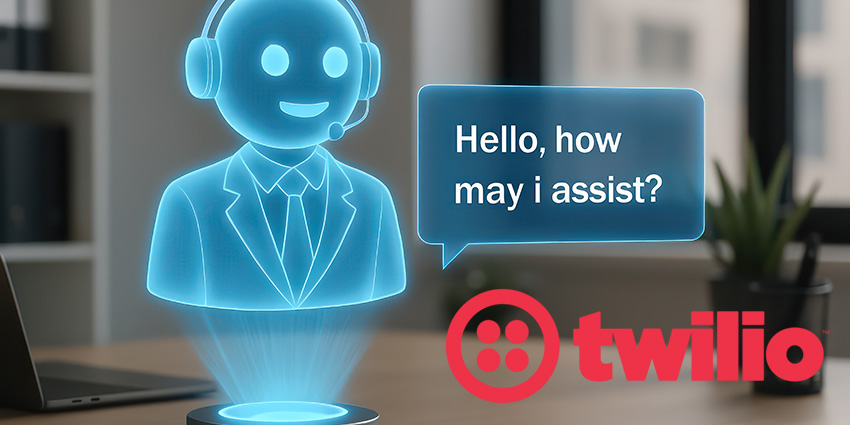Conversational AI has moved beyond the experimental chatbot phase, becoming central to how businesses meet customers as pressure grows to deliver personalized and fast service at scale.
A recent study by Twilio found that businesses in the Europe, Middle East and Africa (EMEA) region are accelerating their investment in conversational AI to enhance customer service and strengthen loyalty as they look to modernize their digital operations.
The report, Inside the Conversational AI Revolution: How to Win the Race to Deliver Exceptional Experiences, found that around 60 percent of organizations are in the final stages of developing conversational AI. That is slightly behind the global average of 66 percent, Twilio noted.
But businesses in EMEA aren’t just pushing ahead with conversational AI, they’re staffing up for it. They tend to have larger teams supporting their initiatives than businesses in other regions. Twilio surveyed more than 4,800 consumers and 457 business leaders in 15 countries, including the UK, France and Germany. On average, EMEA companies dedicate 49 team members to developing and maintaining their AI systems, well above the global average of 36 specialists, Twilio said.
More people on the ground often translates to deeper integration work and broader experimentation.
Around 54 percent of businesses expect to keep their current system in place for more than a year, suggesting that they’re treating AI as a long-term operational capability rather than a short-term experiment.
That mindset also shows up in how these companies are structuring their systems. The vast majority, around 88 percent, are running multiple models at once, mixing different large language models and providers to balance strengths and minimize weaknesses. Instead of betting everything on one system, they’re spreading risk and optimizing for flexibility.
This reflects a broader industry trend to avoid relying on a single AI vendor, as they aim to build more resilient AI stacks in anticipation of rapid model development and evolving regulatory expectations. Peter Bell, VP of Marketing, EMEA at Twilio, said:
“The commitment to conversational AI across EMEA is striking—we’re seeing serious investments in budget, people, and resources. As AI matures, the challenge for leaders is to remain ruthlessly agile, ensuring their systems keep pace with customer needs while prioritizing transparency and building lasting trust.”
Legacy Systems and Data Privacy Risks Hold Back Conversational AI
Despite this momentum, legacy systems are emerging as one of the biggest brakes on AI progress in EMEA. Businesses in the region are nearly twice as likely as their counterparts in the US or Asia-Pacific to cite challenges with existing infrastructure compatibility as their biggest barrier to deploying conversational AI, Twilio found.
Many organizations say their infrastructure isn’t built to support the kinds of real-time, data-hungry applications that conversational AI demands. Fragmented databases and rigid workflows make it harder to plug in new capabilities.
That is part of a broader theme seen across large enterprises. Businesses are eager to roll out smarter customer interactions, but AI adoption is accelerating much faster than the modernization of the systems underneath it. That gap limits the scope of what AI teams can deliver.
The study makes it clear that enthusiasm for conversational AI in EMEA comes with a dose of caution. Only 42 percent of businesses fully trust the models they’re using and almost half, 46 percent, lean on location and device data when personalising interactions. It’s a controlled approach, shaped as much by regulatory expectations and customer confidence as by technical constraints.
That caution is hardly surprising in a region governed by GDPR, active debates over AI governance, and a public that generally expects firms to justify how they collect and use personal data.
Research shows that while consumers are willing to share some data, they are reluctant to give up detailed personal information.
Enterprises are aware that any misstep around transparency or consent carries reputational and legal risks. As a result, AI systems tend to be deployed with tighter guardrails and closer oversight than in other regions.
In the US and parts of Asia-Pacific, businesses face fewer compliance hurdles and, as a result, show more risk appetite when it comes to adopting new capabilities quickly. While other regions prioritise speed, EMEA prioritises accountability, which shapes the approach to AI deployments and the types of data that businesses are comfortable relying on.
In EMEA, more than half of businesses (59 percent) are mainly using conversational AI for technical documentation and FAQs, with 54 percent concentrating on website chat, rather than social media.
Rather than focusing on cost cutting or increasing efficiency through automation, 58 percent of businesses cite brand innovation as the main driver, with 52 percent also citing agent efficiency and 48 percent focused on customer loyalty, showing an emphasis on relationship building.
The study hints at a reset in how companies evaluate the performance of their AI solutions. Businesses are paying closer attention to whether customers are actually happier and sticking around. Around half of organizations say they are prioritizing complaint resolution and 42 percent customer retention to measure ROI, reflecting a pragmatic approach to AI’s value in improving service quality.
Using conversational AI offers enterprises a chance to build trust and strengthen ties with customers over time to deliver long-term value.







